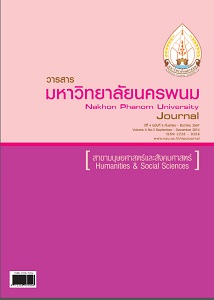การจัดการแรงงานเพื่อคุณภาพชีวิตการทำงานของแรงงานต่างด้าว สัญชาติพม่า ในจังหวัดสมุทรสาคร
Main Article Content
Abstract
การวิจัยครั้งนี้มีวัตถุประสงค์เพื่อ 1) ศึกษาระดับการดำเนินการด้านคุณภาพชีวิตการทำงานของแรงงานต่างด้าวสัญชาติพม่า ในจังหวัดสมุทรสาคร 2) ศึกษาระดับการดำเนินการด้านการจัดการแรงงานภาครัฐของเจ้าหน้าที่พื้นที่และนายจ้างหรือผู้ประกอบการ ในจังหวัดสมุทรสาคร 3) ศึกษาความสัมพันธ์ระหว่างการจัดการแรงงานกับคุณภาพชีวิตการทำงานของแรงงานต่างด้าวสัญชาติพม่า ในจังหวัดสมุทรสาคร และ 4) สร้างตัวแบบการจัดการแรงงานเพื่อคุณภาพชีวิตการทำงาน การศึกษาวิจัยใช้วิธีเชิงปริมาณเป็นหลักและ วิธีเชิงคุณภาพเป็นวิธีเสริม โดยมีขอบเขตพื้นที่การศึกษาในจังหวัดสมุทรสาคร เก็บรวบรวมข้อมูลด้วยแบบสัมภาษณ์เชิงลึกจากเจ้าหน้าที่ ภาครัฐในพื้นที่จำนวน 7 คน ผู้ประกอบการ จำนวน 10 คน และแบบสอบถามปลายปิดจากแรงงานต่างด้าวสัญชาติพม่า จำนวน 1,045 คน วิธีวิเคราะห์ข้อมูลทำโดยใช้สถิติเชิงพรรณนา ประกอบด้วย ร้อยละ ความถี่ ค่าเฉลี่ย ค่าเบี่ยงเบนมาตรฐาน สถิติขั้นสูงที่ใช้ได้ แก่ Canonical Correlation และ Path Analysis ผลการวิจัยพบว่า 1) การดำเนินการด้านคุณภาพชีวิตการทำงานของแรงงานต่างด้าว สัญชาติพม่า ในจังหวัดสมุทรสาคร อยู่ในระดับต่ำ 2) การดำเนินการด้านการจัดการแรงงาน ในภาพรวมอยู่ในระดับปานกลาง 3) การจัดการแรงงานกับคุณภาพชีวิตการทำงาน มีความสัมพันธ์กันในระดับสูง และ 4) การจัดการแรงงานในด้านการเสริมสร้างความ คุ้มครองมาตรฐานแรงงาน และการเสริมสร้างความรับผิดชอบต่อสังคม มีความสัมพันธ์กับคุณภาพชีวิตการทำงานในด้านการได้รับ ความคุ้มครองขั้นพื้นฐาน ด้านความสัมพันธ์ระหว่างชีวิตการทำงานกับชีวิตทั่วไป และด้านความเป็นธรรมในการทำงาน สามารถนำไปสู่ การสร้างตัวแบบการจัดการแรงงานเพื่อคุณภาพชีวิตการทำงานของแรงงานต่างด้าว โดยวิธีการวิเคราะห์เส้นทางเพื่อเป็นแนวทาง การเสริมสร้างความคุ้มครองมาตรฐานแรงงาน และการเสริมสร้างความรับผิดชอบต่อสังคม ซึ่งจะส่งผลต่อคุณภาพชีวิตการทำงานของ แรงงานต่างด้าวในการทำงานได้รับความคุ้มครองขั้นพื้นฐาน ความสัมพันธ์ระหว่างชีวิตการทำงานกับชีวิตทั่วไป และความเป็นธรรมใน การทำงาน บนหลักปฏิบัติการใช้แรงงานที่ดี
The objectives of this study were to: 1) investigate the operating level of quality of work life of the Burmese migrant workers in Samut Sakhon province, 2) examine the operating level of management of labor among local government officials and entrepreneurs, 3) examine the relationship between management of labor and quality of work life among the Burmese migrant workers in Samut Sakhon province, and 4) create a model of management of labor for quality of work life. The study mainly employed quantitative research method and used qualitative research method as a supplement. The scope of study area was limited to Samut Sakhon province. Data collection was conducted through in-depth interviews from 7 government officials and 10 entrepreneurs and through a close-ended questionnaire from 1,045 Burmese migrant workers. Data analysis was done using descriptive statistics of percentage, frequency, mean, and standard deviation. The advanced statistics of canonical correlation and path analysis were also employed. The findings were as follows: 1) The operating in Burmese migrant workers’ quality of work life in Samut Sakhon province was at low level; 2) the operating in management of labor as a whole was at moderate level; 3) management of labor and quality of work life were highly correlated; and 4) management of labor in terms of enhancing the protection of labor standards and enhancing responsibility for the society was in relation to the quality of work life in those aspects of being basically protected, of relationship between the work life and life in general, and of fairness in work. Such enhancements of labor in relationship with quality of work life are able to lead to creating a model of management of labor for migrant workers. The path analysis was conducted as a guide to enhancing the protection of labor standards and the responsibility for the society. This will affect migrant workers’ quality of work life. Basic protection is to be given to them by allowing them to relate their work life to life in general, and allowing them to receive fairness in work based on the principle of good labor practice (GLP).


